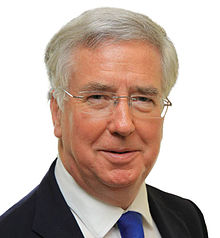Secretary of State for Defence
|
United Kingdom Secretary of State for Defence |
|
|---|---|

Royal Arms as used by Her Majesty's Government
|
|

|
|
| Ministry of Defence | |
| Style |
The Right Honourable (Formal prefix) Defence Secretary |
| Member of |
British Cabinet Privy Council National Security Council Defence Council Admiralty Board Army Board Air Force Board |
| Reports to | The Prime Minister |
| Seat | Westminster, London |
| Appointer | The British Monarch on advice of the Prime Minister |
| Term length | No fixed term |
| Formation | 1 April 1964 |
| First holder | Peter Thorneycroft |
| Website | www |
Her Majesty's Principal Secretary of State for Defence (Defence Secretary) is an official within Her Majesty's Government and head of the Ministry of Defence. The office is a British Cabinet level position.
The post was created in 1964 as successor to the posts of Minister for Coordination of Defence (1936–1940) and Minister of Defence (1940–1964). It replaced the positions of First Lord of the Admiralty, Secretary of State for War, and Secretary of State for Air, as the Admiralty, War Office and Air Ministry were merged into the Ministry of Defence (the Secretary of State for War had already ceased to be a cabinet position in 1946, with the creation of the cabinet level Minister of Defence).
The position of Minister for Co-ordination of Defence was a British Cabinet-level position established in 1936 to oversee and co-ordinate the rearmament of Britain's defences.
The position was established by Prime Minister Baldwin in response to criticism that Britain's armed forces were understrength compared to those of Nazi Germany. This campaign had been led by Winston Churchill and many expected him to be appointed as the new minister, though nearly every other senior figure in the National Government was also speculated upon by politicians and commentators. Despite this, Baldwin's choice of the Attorney General Sir Thomas Inskip provoked widespread astonishment. A famous comment made in response to Inskip's appointment was "This is the most cynical appointment since Caligula made his horse a consul". The appointment is now regarded as a sign of caution by Baldwin who did not wish to appoint someone like Churchill who would have been interpreted by foreign powers as a sign of the United Kingdom preparing for war, as well as a desire to avoid taking on board a controversial and radical minister.
...
Wikipedia

